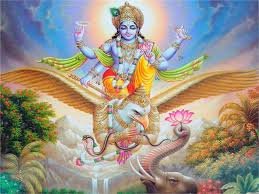|
Shukdev ji tells a story of elephant Gajendra Moksha to Raja Prakshit. On Trikuta Mountain, one strong and powerful elephant named as Gajendra lived. He was husband of many female elephants. It was very hot summer. Gajendra along with female elephants & children went to a lake for playing in water. The elephants began to splash water on one another.
Suddenly, a crocodile named as Magara caught one leg of Gajendra. Gajendra tried hard to get rid of him but could not break free. Elephant is terrestrial animal and Magara is aquatic animal. Terrestrial animals become weak in water. He then, called out for help. All elephants gathered around him and tried to help, but in vain. Magara was pulling the Gajendra into deep water. The struggle between Gajendra and Magara continued for one month. Other elephants thought that Gajendra would not survive and hence, they left from there. Gajendra was began to tire and believed that nobody would help him. He realized that only almighty could help him. Gajendra desperately called up Narayana for help. Hearing the call of Gajendra, Vishnu Bhagwan appeared on his vehicle Garuda. Gajendra saw Vishnu Ji and offered one lotus flower. Vishnu ji accepted lotus flower and killed Magara with his sudarshan chakra. Spiritual Significance:
Shrimad Bhagwat Mahapuran by Shri Ramchandra Keshav Dongra ji Maharaj
1 Comment
Story
Atamdev, one brahmin was living in the village, near Tungabhadra River. Atamdev was pure hearted person, but his wife, Dhundhli was quarrelsome and cruel lady. Atamdev had no child. Because of that he was miserable. One day, he decided to commit suicide and proceeded towards the river. He met there one saint. The saint asked him reason for sadness. He said, he has plenty of food and wealth but there is nobody to enjoy it. Hence, he has come here to commit suicide. Saint told Atamdev, it rather blessing. Almighty want everything should be done through you. Son is a form of sorrow. Atamdev sought blessings for son because son is necessary for moksha. Saint explains that for the protection of the generations, one should do good work. Shradha (annual rites done after death) can only facilitate to get better next life but it cannot provide moksha. Rather if you offer yourself to almighty, it will bring well-being to you. But Atamdev insisted saint on getting son otherwise he will commit suicide. Then saint gave him one fruit and asked to give it to his wife. After eating the fruit by his wife, she will be blessed with a son. Atamdev came back home and gave the fruit to his wife to eat. Dhundhli started fallacious arguments instead of eating fruit. She thought by eating fruit, she will be pregnant and therefore miserable. Bringing up the child will get greater misery. She fed the fruit to cow and played as she is pregnant. Later she brought the son of her sister pretending that he is her son. Dhundhli named her son as Dhundhukari. The cow gave birth to human son with big ears. He was named as Gokaran. Both boys grew up. Gokaran was wise but Dhundhukari was wicked, adulterous and remained un-clean. Dhundhukari indulged into five prostitutes. He was not observing trikal Sandhya. Atamdev was feeling guilty for his son and thought he was better without son. Dhundhukari expended entire wealth and started beating his parents. Looking all this, Gokaran came to Atamdev and preached about vairagya (dispassion). He told, it is better that he should leave attachment of wife & son and go to forest for bhakti. Atamdev went near to river and started meditation for 10-12 hours a day. He was fully absorbed into almighty. By studying tenth skanda of Shrimad Bhagwat Purana, he got moksha (liberation). Dhundhukari started earning through illegal means. He stole jewelries from king’s palace and handed over to prostitutes. Prostitutes thought, if Dhundhukari remained alive, they would be captured by king. King would take away entire wealth and may punish also. Hence, it would be better to kill Dhudhukari. They tried to kill him by hanging but he did not die. Later, they stuffed his mouth with hot coals and he died. When Gokaran heard about death of Dhundhukari, he went Gaya and did pinddaan (Shradha). On return to home, Gokaran heard voice of weeping. Gokaran asked, who is weeping and why such condition. Ghost told that he was his brother and has become ghost after death. Gokaran asked despite performing shradha, how is he continuing as Ghost. He decided to ask Suryanarayan Bhagwan the remedy. Suryanarayan Bhagwan informed Gokaran that by Shrimad Bhagwat Katha, he can be get liberation. Gokaran arranged seven days Shrimad Bhagwat Katha. Dhundhukari also came listening to the katha but could not get place to sit. Then he entered into a stick with seven knots. Every day, one knot was breaking. On seventh day, last knot was also broken and the ghost got moksha. Spiritual Significance explained by Dongra ji Maharaj –
Source Shri Shrimad Bhagwat Rehsaya by Shri Ramchandra Keshav Dongra ji Maharaj |
Archives
May 2024
Categories |

 RSS Feed
RSS Feed